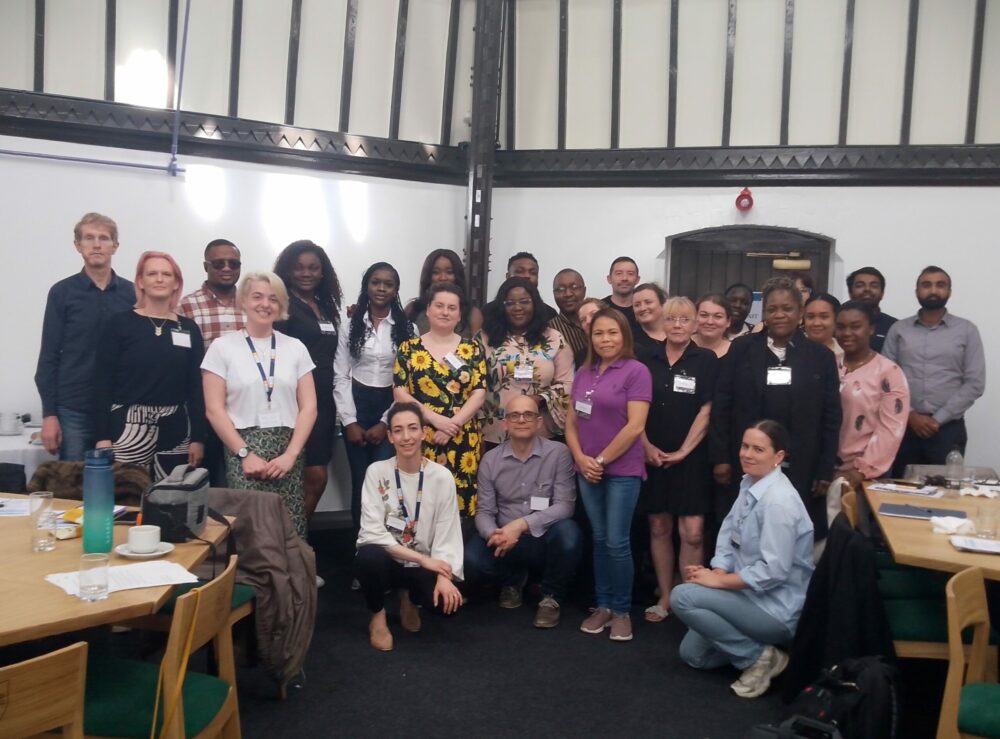In this post, Karolina Gerlich, Chief Executive of The Care Workers’ Charity, talks about AI in social care and how it could shape the future of the sector. Karolina shares some of her reflections and insights on a topic that’s rapidly gaining attention.
1. How did the journey with AI start for you?
Earlier this year, I organised a roundtable to discuss AI in social care. The idea came to me after attending a meeting at Oxford University in January, where industry leaders gathered to talk about the future of our sector. It became clear to me that we needed to have a similar conversation focused specifically on care workers—because, after all, when it comes to decisions that affect care work, care workers should always have a voice at the table.
I spoke with Dr Caroline Emmer De Albuquerque Green, Director of Research at the University of Oxford, and she helped secure funding for the event. We then spoke with Digital Care Hub who we wanted to be involved in the discussion. By the end of May, we had 20 care workers sitting around a table, ready to dive into the discussion. We covered their expenses and accommodation to make sure they could fully participate without any financial concerns. It was incredible to hear their thoughts—how they envisioned AI fitting into their day-to-day roles and what would genuinely help them in their work. From those discussions, we began drafting practical guidance for the sector, aiming to create something that could truly make a difference.
2. How do you think AI might change care workers’ jobs?
Honestly, I think AI has the potential to make life easier for care workers by reducing the time spent on admin tasks, giving them more time to do what they’re really there for—providing meaningful care. Care work is so personal, and no technology can ever replace the human connection at its core, but AI can create the space for more of those special moments.
For example, AI could help streamline searches, build care plans, or even suggest creative activities. I’ve seen care workers use AI to create portraits of the people they care for or craft personalised stories, making their day a little brighter. These tools are helping to enrich the experience for both the care worker and the person receiving care.
But, of course, it’s essential that AI is used responsibly. Training care workers on how to use these tools safely, while respecting data protection and consent, is crucial—especially given the vulnerable people we work with. The consequences of misusing technology in our sector could be serious, so we need to get it right.
3. Tell us about some of the work you’re doing on AI and social care …
One of the projects I’m most excited about is the guidance we’re working on for the safe and effective use of AI in social care. Right now, there are no official regulations from the government on this, so we’re taking it upon ourselves to develop a framework that prioritises safety, data protection, and proper training. We’re aiming to launch this during Professional Care Workers Week, starting on the 16th of September, and I can’t wait to share it with you all.
But this guidance is just the start. It will be a living document, constantly updated as new technologies emerge and as we learn from care workers who are already using AI in the field. We’ll be collecting best practices, case studies, and even cautionary tales to help guide the sector through this rapidly changing landscape.
4. How are you using AI? And how are you supporting care workers to use it?
At The Care Workers’ Charity, we’ve started using AI internally, particularly in areas where it helps us manage workloads and increase our efficiency. From drafting documents to organising data, AI has been a real asset to our team. But more importantly, we’re committed to staying active in this space—ensuring that as AI continues to evolve, so do the training and resources available to care workers.
Our main goal is to make sure no care worker is left behind. Whether someone is tech-savvy or not, we want to ensure everyone has access to the training they need to feel confident using AI. Everyone learns at their own pace, and we’re here to support that journey.
5. How do you see the future of AI in social care?
AI has the potential to transform social care in ways we’re just beginning to understand. But it’s crucial that we approach this transformation with care, keeping the voices of care workers at the heart of every decision. Together, we can shape a future where AI enhances the quality of care while empowering those who provide it.
If you’re interested in joining this conversation, feel free to reach out to us at info@thecwc.org.uk, or come and say ‘hello’ at one of the conferences we’ll be attending. We’d love to hear your thoughts and experiences as we continue exploring AI’s role in social care.

